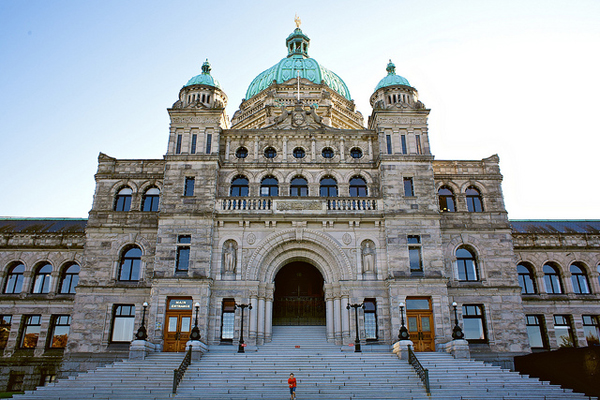[Editor's note: British Columbia's economy is growing. Much of that growth rests on expanded resource industries. Yet our laws designed to protect the unparalleled beauty and richness of the B.C. environment have been weakened, both federally and provincially, over the past decade. This Tyee special series, in cooperation with the Environmental Law Centre at the University of Victoria, reveals what B.C.'s leading experts in environmental law say most needs to be fixed, and their specific suggestions for change. To read all their recommendations, download the free electronic publication Maintaining Natural British Columbia for our Children: Selected Law Reform Proposals. Last in our series, today we look at the need for stronger rights to know, and to protect whistleblowers.]
The Freedom of Information and Protection of Privacy Act was designed to give citizens direct access to government records -- to unvarnished, un-spun information that can be used to hold government to account.
However, the Act isn't working as intended. We're coming up to the 20th anniversary of the Act's passage, and it is showing its age. High fees, long delays and unjustified government claims for exemptions from the duty to release are common problems. Some problems have become so extreme that only legislative changes will fix them.
Here are some key things that need urgent overhaul.
Policy advice exemption
This exception from the general duty to disclose records is supposed to allow ministers to receive "full and frank" advice from civil servants about policy matters without having to worry about the policy advice being released later. This statutory exemption from disclosure was explicitly not meant to include factual material, audits, and other studies and reports to government.
However, a 2002 Court of Appeal decision and Information Commissioner orders following that decision have interpreted the "advice or recommendations" exemption so broadly that:
Responses to a government stakeholder consultation exercise are now considered "policy advice";
A pamphlet on the HST to be sent to every household in British Columbia is considered by the government to be "policy advice"; and
A university's request that the government bring in a retroactive law to make illegal parking fines legal is counted as giving the government policy advice rather than just lobbying.
A Special Committee of the Legislative Assembly that reviewed the Act in 2004 recommended amendments to fix the problems created by the Court of Appeal's decision. However, government has not acted. Another Special Committee review in 2010 reversed that recommendation, but this black hole at the centre of the public's right to know is getting deeper. As the 2004 Special Committee saw, legislative reform is the only way to fix this problem.
Cabinet records
The current law allows government to make an excessive number of claims for cabinet secrecy. Again, a Court of Appeal decision broadened this exemption from the public's right to know, and that decision has been expanded by government interpretation, resulting in too much secrecy. Particularly for background analyses and other documents, the Act should be amended to protect legitimate cabinet confidentiality, but also enhance the public's right to know about environmental matters.
Spoken words that are not reduced to a "record" are beyond the scope of the Freedom of Information and Protection of Privacy Act. Unsurprisingly, governments, especially the upper levels of government, have been moving to an increasingly oral culture. Senior bureaucrats seem to hate writing things down, especially anything that might result in controversy. Two examples from the recent past:
Ken Dobell, the premier's deputy minister said in 2003, "I don't put stuff on paper that I would have 15 years ago… Civil servants are choosing not to write things down, or at least I am"; and
Just last year, former premier's deputy minister Allan Seckel confirmed the continued existence of the oral culture in the Premier's Office, when he wrote a letter to the Information and Privacy Commissioner. The Commissioner was investigating the absence of documents about a 33 per cent reduction in BC Ferries rates. Seckel stated: "The 'proposal' Mr. Hahn refers to in his letter was oral, hence no records in relation to such a 'proposal' exist."
This can't be allowed to continue. If it does, not only will accountability suffer but the often crucial historical record of decision making will be irrevocably damaged. Major policy decisions should not have to be re-created by interviewing retired deputy ministers at the Old Bureaucrats Home in the faint hope they remember why government acted the way it did.
A positive duty to record decision making, and minimum requirements for record keeping in critical areas must be incorporated into the Act.
Proactive release of records
There should be a legal requirement to proactively post certain government records and data. The Information Commissioner has already stated that contracts and audits should be posted as a matter of course, yet that still hasn't happened. The 2004 Special Committee recommended that public bodies be required to routinely release, pro-actively, regularly and without request, categories of records set out in "publication schemes" approved by the Commissioner. The U.K. has this model, and B.C. should adopt it.
Now that government's open data and open government initiatives are underway, we should expect that certain types of information will be routinely posted. The law should require that key data be truly open, available regularly and posted in a timely way, without charge. Real-time environmental monitoring data -- for example, emissions data from pulp mills and other industrial facilities -- should be posted on the Internet. The law should require this data to be posted in machine-readable format so that public groups can readily analyze the data and publish the results.
Public interest disclosure
Section 25 of the Freedom of Information Act is supposed to require the immediate release of information, without request, when release is in the public interest. The provision was intended to keep the public promptly informed of environmental and health risks and to promote government and polluter accountability. Unfortunately, information is almost never released under this section, despite a string of high-profile cases where public bodies sat on information involving risks to the environment and public health.
Section 25 must be clarified and the threshold for determining when the public interest requires disclosure must be lowered. Similar provisions work well elsewhere and the time has come to bolster this important section.
Delays and fees
There is a major issue with the number of delays that frustrate timely access to information with no negative consequences for public bodies. It takes too long for public bodies to respond to requests for environmental information, and those bodies are able to get too many extensions. Reforms should include speedier response timelines for environment-related material -- consistent with the public interest over-ride concept of public disclosure without delay. Penalties should apply to public bodies that illegally delay disclosure.
Excessive fee requests (some have been in the tens of thousands of dollars) and refusals to waive fees are also a widespread problem. The law should be changed to ensure that information requests on environmental protection issues are not stymied by high fees. Non-profit groups should pay at a lower rate and be eligible for public interest fee waivers on more progressive criteria than now exist.
The provincial government has yet to fully respond to the reports of the 2004 or 2010 Special Committees of the Legislature that reviewed the Freedom of Information and Protection of Privacy Act. Meaningful action is overdue.
For more information, see:
Special Committee to Review the Freedom of Information and Protection of Privacy Act (2010) Report.
Submissions on Review of the Freedom of Information and Protection of Privacy Act. BC Freedom of Information and Privacy Association
The Need for Anti-SLAPP Legislation in Ontario. Canadian Environmental Law Association. ![]()
Read more: BC Politics, BC Election 2013


















Tyee Commenting Guidelines
Comments that violate guidelines risk being deleted, and violations may result in a temporary or permanent user ban. Maintain the spirit of good conversation to stay in the discussion.
*Please note The Tyee is not a forum for spreading misinformation about COVID-19, denying its existence or minimizing its risk to public health.
Do:
Do not: